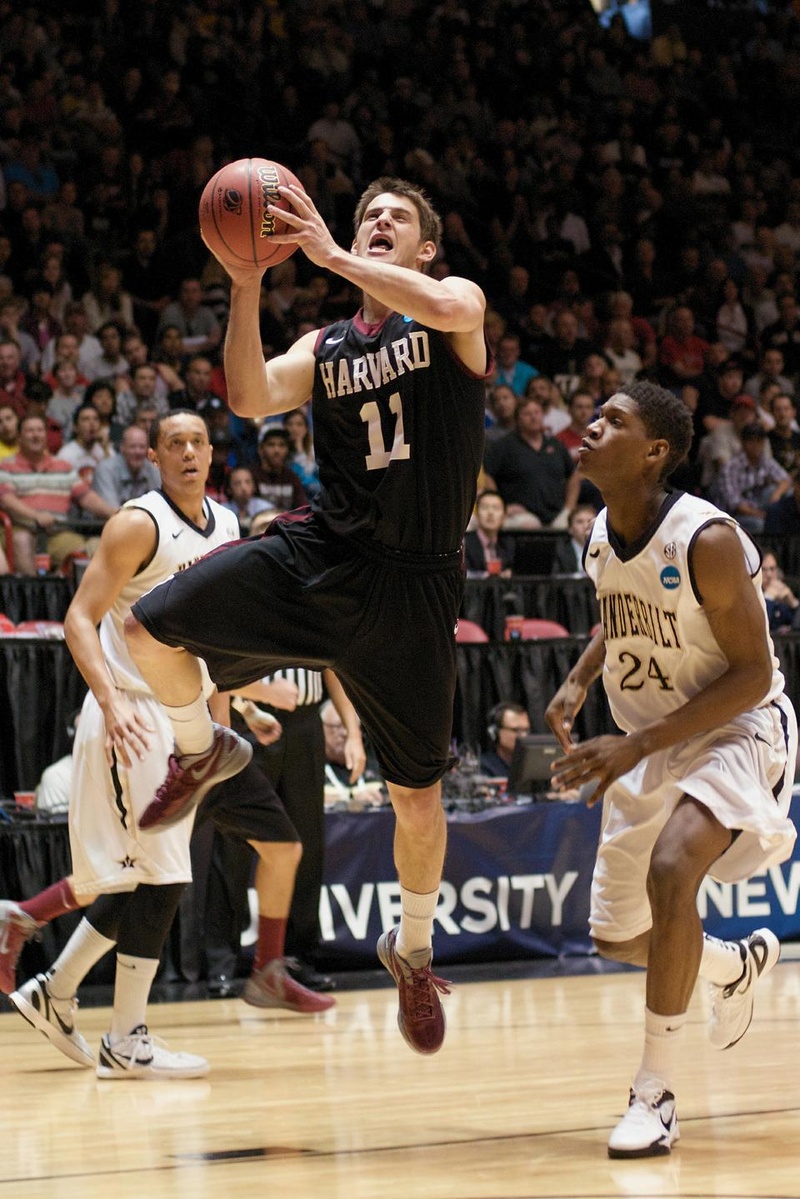
Co-captain guard Oliver McNally attacks the basket during the Harvard men's basketball team's matchup with Vanderbilt in the second round of the NCAA tournament on March 15. It was the Crimson's first NCAA tournament appearance since 1946.
The Harvard men’s basketball team did not have a single player finish in the top 10 in the Ivy League in scoring during the 2011-12 season. Nor did any individual play over 30 minutes per game.
No one on the squad won the league’s Player of the Year award, nor the Rookie of the Year award, nor the Defensive Player of the Year award.
But despite no one individual turning in a standout performance, the team’s season as a whole does stand out. For during the 2011-12 campaign, the Crimson did a lot of things no Harvard men’s basketball team had ever done before.
It won an outright Ivy title for the first time in program history, setting a school record for wins with 26 in the process. It held its first ever “Crimson Madness” to mark the season’s commencement, played in (and won) its first in-season tournament, and achieved its first national ranking.
Indeed, it was a special year for the Harvard men’s basketball team, one that marked the culmination of a five-year overhaul of the program under head coach Tommy Amaker that saw it go from an 8-22 team in 2007-08 to a 26-5 one in 2011-12.
The season was capped by the Crimson’s first NCAA tournament appearance in 66 years, a nine-point loss to Vanderbilt that nonetheless marked a triumphant and long-awaited return to college basketball’s biggest stage.
“It was a great season, without a doubt,” junior guard Brandyn Curry says. “Winning an outright conference championship, winning the Bahamas tournament—there were definitely a lot of good things.”
That season began with a blowout victory over cross-river rival MIT at Lavietes Pavilion. It would not be until the season’s final home game—a 55-54 loss to Penn—that the Crimson would fall on its home court, ending what was at the time the second longest home winning streak in the country.
In between—thanks in large part to a stifling defense that allowed just 55.6 points per game, fourth best in the nation—the Crimson continued to find success.
At the Battle 4 Atlantis tournament over Thanksgiving break, Harvard unexpectedly took home the title by sweeping Utah, future ACC Champion and then-No. 22 Florida State, and Central Florida in the Bahamas.
After subsequent wins over Vermont and Seattle made Harvard 8-0, the Crimson earned a spot in the national rankings—No. 24 in the ESPN/USA Today Coaches Poll and No. 25 in the Associated Press poll—and it would remain ranked for six of the next seven weeks, peaking at No. 21.
“This is a significant achievement,” Harvard coach Tommy Amaker said at the time. “I’m proud of the hard work [the team] put in, and I’m very pleased and flattered that we’ve been thought of in that capacity at this point of the season.”
Harvard suffered its first loss of the year in its next contest, a 67-53 defeat at then-No. 9 UConn, but won 13 of its next 14, including key non-conference victories over Florida Atlantic, Boston College, and St. Joseph’s. It did not lose an Ivy League game until Feb. 11, when it fell by eight at Princeton, and finished the year by taking five of its final six.
The Crimson clinched at least a share of its second consecutive Ivy title with its 67-63 win over Cornell on March 3, and Penn’s loss at Princeton three days later sent Harvard dancing at long last.
“Oh my God, this is crazy, this is absolutely crazy,” co-captain Keith Wright said shortly after that goal was achieved. “You have no idea how excited I am. I’ve been running for 30 minutes, in the freezing cold, screaming at the top of my lungs.”
A week later, the Crimson threw all it had at the Commodores, who had won the SEC tournament days earlier by beating eventual national champion Kentucky. Despite staging a late-second-half rally, Harvard fell, 79-70, ending its season in Albuquerque.
But the Crimson could nonetheless take pride in having done something that hadn’t occurred at Harvard in over six decades, a destiny it achieved as a team in every sense of the word.
Now able to cross one major objective off its checklist, Harvard is already turning its attention towards taking the next step and reaching even greater heights.
“The tournament showed us we’ve come a long way, but we’ve still got a long way to go,” Curry says. “We’ve still got a lot of work we have to do if we want to get to that level and compete with those teams and advance in the tournament, which is our last goal.”
—Staff writer Scott A. Sherman can be reached at ssherman13@college.harvard.edu.
Read more in Sports
MEN'S HOCKEY: Crimson Comes Within a Game of ECAC Title












